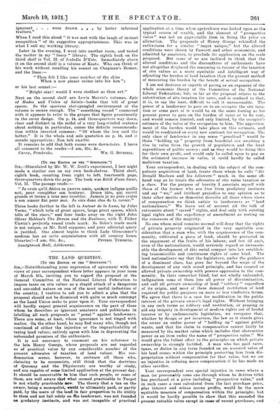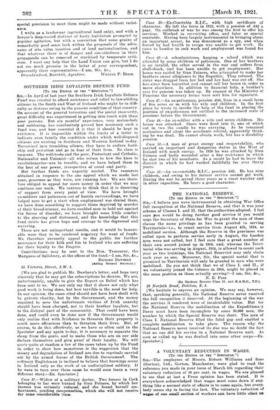THE LAND QUESTION.
[To THE EDITOR or THE " SPECTATOR.] Sta,—Notwithstanding your expression of agreement with the views of your correspondent whose letter appears in your issue of March 5th, inviting you to regard the proposal of the General Committee of the National Liberal Federation to impose taxes on site values as a stupid attack of a dangerous and one-sided nature on one of the most useful industries of the country, I venture to ask you to admit a plea that the proposal should not be dismissed with quite so much contempt as the Land Union seeks to pour upon it. Your correspondent will hardly expect general acquiescence on the part of those whom he describes as ignorant amateurs and politicians in labelling all such proposals as " penal" against landowners. There are some, at least, whose ignorance is not tinged with malice. On the other hand, he may find many who, though not convinced of either the injustice or the impracticability of taxing land values, entirely agree with him in deprecating the unbounded promises of the enthusiasts.
It is not necessary to comment on his reference to the late Henry George, whose proposals are not regarded as of practical value by any considerable number of the present advocates of taxation of land values. His con- demnation seems, however, to embrace all those who, claiming to be economists, still think that the doctrines of Quesnay and the Physiocrats are worthy of study, and are capable of some limited application at the present day. It should be conceivable to him that such people, or some of them, are well aware that what seemed practicable to Turgot is not wholly practicable now. The theory that a tax on the owner, being a monopolist, would be ultimately paid, or partly paid, by the users of the land in fair proportion to its utility to them and not fall solely on the landowner, was not founded on predatory instincts, and was not incapable of practical application at a time when agriculture was looked upon as the typical source of wealth, and the element of "Prospective
value" was not an appreciable item in fixing the price on alienation. The proposals of Henry George rekindled the enthusiasm for a similar "impot unique," but the altered conditions were shown by Fawcett and other economists, and admitted by amateurs, to preclude its application on the scale proposed. But some of us are inclined to think that the altered conditions and the discomfiture of enthusiasts have not altogether displaced the reasoning in favour of the taxation of site values as a more equitable and intelligent way of adjusting the burden of land taxation than the present method of measuring the burden by the benefit of actual occupation.
I am not desirous or capable of posing as an exponent of the whole economic theory of the Committee of the National Liberal Federation; but, so far as the proposal relates to the substitution of site taxation for rates, and is confined to that. it is, to say the least, difficult to call it unreasonable. The power of a landowner to pass on to an occupier the site taxa- tion or some part of it would be on the same footing as his present power to pass on the burden of rates or to fix rent, and would remain limited, and only limited, by the occupier's estimate of the value of the occupation to him. The apportion- ment of the burden would take place on this estimate, and would be readjusted on every new contract for occupation. The only class of landowner in any sense "penalized " would be those "holding up" property from beneficial use awaiting a rise in value from the growth of population and the local expenditure of public money; and as they would be doing this for their own profit, and would only be called upon to pay on the estimated increase in value, it could hardly be called malicious taxation.
Your correspondent, in dealing with the subject of the com- pulsory acquisition of land, treats those whom he calls " Sir Donald Maclean and his followers " much in the same off- hand way as he treats the advocates of site value taxation as a class. For the purpose of brevity I associate myself with those of the former who are free from predatory instincts and say " we," and (without prejudice to any opinion as to their other merits or demerits) describe all those whose views of compensation we think unfair to landowners as "land nationalizers." We leave out of account all the talk of extremists about " sacred " rights, and deal only with existing legal rights and the expediency of amendment as resting on the consensus of the majority.
No one whose mind remains normal will deny that the rights of private property originated in the very equitable con- sideration that a man who, with the acquiescence of the com- munity, cultivated a piece of land, should be protected in the enjoyment of the fruits of his labour, and few (if any), even of the nationalizers, would seriously regard as unreason- able the development of this social compact into law establish- ing transmissible and continuous rights of some kind. The land nationalizers say that the legislature, under the guidance of a dominant class, has gone far beyond the scope of the development of any such sound principle, and has created or allowed private ownership with powers oppressive to the com- munity. In their somewhat blind, but not wholly unfounded, indignation some of them lose all power of discrimination. and call all private ownership of land "robbery " regardless of its origin, and most of them demand restitution of land required for public purposes on more or less vindictive terms. We agree that there is a case for modification in the public interest of the private owner's legal rights. Without bringing in any such terms as robbery and restitution, or praying in aid any iniquity in development of modern rights out of feudal tenures or by undemocratic legislation, we recognize that, whether by design or per incuriam, the law as it stands gives the owner an undue power of " holding up " against public wants, and that his claim to compensation cannot fairly be measured by the market value which includes that obstructive power as an item under the name of "prospective value." We would give the fullest effect to the principles on which private ownership is strongly fortified. A man who has paid rates, taxes, or duties in any form founded on an assumed value of his land comes within the principle protecting him from dis- propriation without compensation for that value, but we see no injustice in refusing more compensation if he has made no other sacrifice.
Your correspondent sees special injustice in cases where a man (or presumably some one through whom he derives title) has purchased at a price including " prospective value," and in such cases a sum calculated from the last purchase price, plus interest and minus mesne profits, would be the more equitable measure of compensation within the principle; but it would be hardly possible to show that this exceeded the present rateable value except in cases of recent purchases, and
*pedal provision to meet them might be made without resist- ance.
I write as a landowner (agricultural land only), and with a lawyer's deep-rooted distrust of hasty legislation prompted by popular agitation, but with a conviction that some grains of remarkably good sense lurk within the proposals of the advo- cates of site value taxation and of land nationalization, and that whatever there is of danger and one-sidedness in their propaganda can be removed or sterilized by temperate criti- cism. I want any help that the Land Union can give, but I do not see much promise in the letter of your correspondent, apparently their representative.—I am, Sir, &e.,
Drunilamford, Barrhill, Ayrshire. WILLIAM P. BEALE.



































 Previous page
Previous page